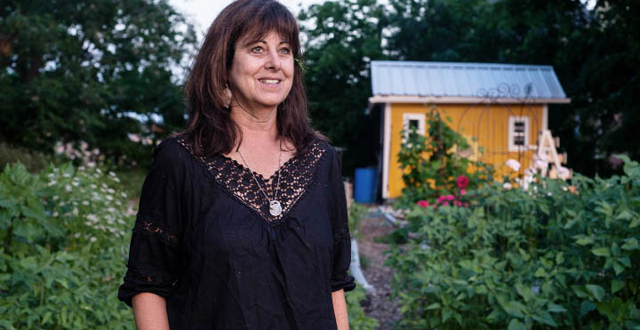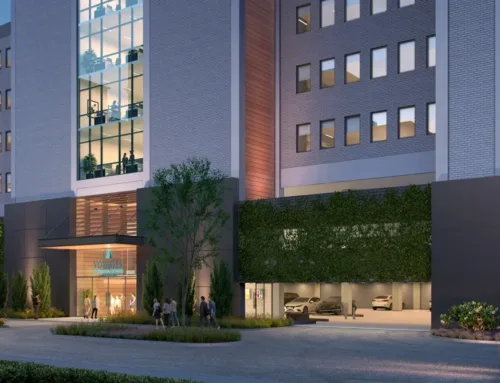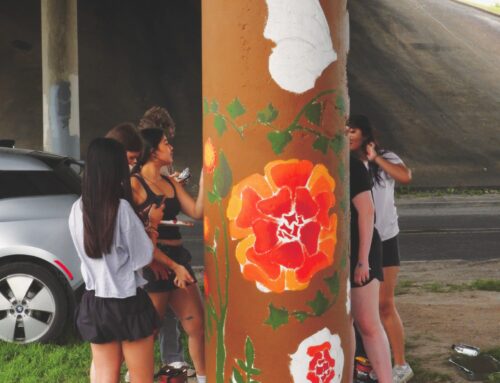From garden to table
“They paved paradise and put up a parking lot,” singer-songwriter Joni Mitchell famously sang in the ’70s. It happens all the time: Trees go down and buildings go up, all in the name of progress. This summer, Elizabeth Dry plans to reverse that trend on a property in East Dallas by covering what’s currently a parking lot and putting up a paradise in its place. She’s asking neighbors to “come aboard the peace train” with her and get their hands dirty building a community garden, but some nearby neighbors aren’t so sure the “peace train” is going to be as peaceful as Dry claims.
Putting down roots
Dry, a teacher at Alex Sanger Elementary with a knack for making things grow, is the founder of Promise for Peace community garden off East Grand. She founded the nonprofit in 2009 as a hopeful solution to some big problems she recognized in students. “I kept seeing the same problems keeping children from being successful, or families from being successful,” she explains. Disconnect, from the planet as well as from the community around them or even other students they didn’t understand, seemed to be keeping kids from reaching their potential. “They’re in their own little living room, and they bring the world into their house, but they’re not connected to the world right around them,” she says. “I was just frustrated with how children were increasingly becoming lost within our education system.”
That summer, she found the empty lot on Grand and started dreaming. “I just thought, if there was a place that was beautiful, like a sanctuary, where people could gather and see each other for who they really are, while learning to live their best, healthy life, and that includes everyone because we all are going too fast, we’re all not being the best we should be and feeling the most joy we could be.” At the same time, the City of Dallas had a Loving My Community stimulus grant, which Dry applied for and won. In one month, she received funding, signed a lease and developed a nonprofit. “It all just fell into place,” she explains. In November, she hosted the groundbreaking, and several city officials showed up in support. “It was just confirmation that there really is something happening here. Everyone seemed to want it to happen.”
Dry’s intention was to gather some students together from surrounding schools, to teach them about nature and let them test out their green thumbs, but over the years, it’s turned into even more than she first dared to hope. In three and a half years, people from 48 schools and 21 countries have visited the garden. Many local organizations and business have reached out to Dry and provided countless resources and volunteers to the grassroots organization. “It has gone so far beyond my vision that I’m pretty convinced something like this could help any community thrive,” she says. “It just draws people together.”
Promise for Peace offers classes for students every Saturday for five weeks in spring, summer and fall during Kids Camp, where they’re taught through trial and error how to plant and care for flowers, food-producing plants and other greenery. People from around the Metroplex find their way to East Dallas for tours or field trips. Promise of Peace partners with local chefs to offer cooking classes where students learn to prepare healthy “from garden to table” meals or snacks.
Room to grow
Dry has a lot on her plate, but she isn’t slowing down anytime soon. In March, Dry said the nonprofit was ready for the “next step” and mentioned she thought a big move was on the horizon. With major developments such as Lincoln Property Co.’s Arboretum Village shopping center across the street, The Lot restaurant next door and other restaurants popping up around the property, Dry figured her little plot was about to become a hot commodity — one she wouldn’t be able to afford for long. But she was already a step ahead, searching for a new location where she could put down roots.
Dry pays $800 in rent every month for the property on Grand, so she was hoping to land somewhere cheap or free. That way, any money donated to the organization could go directly toward the program. She started partnering with businesses on smaller projects, such as the children’s garden at The Lot. In April, Promise of Peace partnered with Hotel Palomar and planted a garden at C. C. Young, but, all the while, she had something bigger up her sleeve.
In February, Dry met with Mitchell Boone, the associate pastor of White Rock United Methodist Church. He was interested in starting a community garden in the parking lot across the street from his church in Little Forest Hills. “I didn’t know how to go about starting a community garden,” he says. So he sought Dry’s expert advice.
When he met with Dry, it sparked something unexpected yet welcome on both ends — the possibility of a partnership. White Rock United Methodist had a large space with which to be creative, and POP was looking for a new home base. It seemed like a natural fit, so both left to seek advice from their respective board members.
The idea was a “go” by both parties. So, for a whopping $1 a year, White Rock United Methodist Church plans to lease the parking lot across the street for POP to do with as it will. The WRUMC staff also plans to make other conveniences available to the garden, such as its large industrial kitchen, office space and bathrooms.
“There’s a lot of passion behind [Promise of Peace], and I think we can learn from them, in how they interact with the community,” Boone says. “I hope to see the garden be a place that makes a difference for people who are hungry in the city, while also teaching children how to take care of the earth.”
Originally, Dry had big plans for the space, which she affectionately calls the Imagine Project. She’s hoping to make the move this summer and be fully up and running by fall. The first step is to ready the lot with mulch and dirt, irrigation and electricity. After that, Dry dreamed of picnics, movie screenings, cooking classes, chicken coops and butterfly gardens; she even hoped to make it handicapped-accessible. “It’s going to be a paradise,” she predicted. But now, things aren’t looking quite as sunny.
Trouble in paradise
During the last days of April, piles of mulch began to be delivered to the parking lot across from the Methodist church. Some of the neighbors were curious, confused and concerned, particularly the neighbors immediately surrounding the lot. Dry put out handmade signs announcing the arrival of the garden, which led some of the neighbors to look up the organization’s website. When they saw pictures and stories about fundraisers, live music and busloads of children, some of them became afraid the Promise of Peace garden was going to be anything but peaceful.
The neighbors directly next to the garden at 9038 Santa Clara, Marj Rash and William Logg III, were particularly upset.
“This is being thrust upon us with no concerns as to how it will impact the area,” Rash says in an email. “Increased traffic and noise. I am not looking forward to fundraising concerts 10 feet from my home office or bedroom window.”
Rash’s sentiments, particularly those about noise and traffic, were echoed by a handful of others in the neighborhood as well.
Roxanne King, another nearby neighbor, sent a letter to Dry saying she is “completely against this plan” and has “no intention of being receptive to this at any point.”
“While you feel this is a great addition to our neighborhood, I couldn’t disagree more,” she writes. “Do not even attempt to lie and say it will be a quiet unobtrusive activity. Do not pretend that people will not park in front of our homes for your garden or that you will not have music, sales events, fundraisers and the like all opening up our homes to further intrusion on a regular basis.”
Nearby neighbor Natalee Morse shared a similar perspective.
“This is a wonderful, quiet neighborhood and we do not want it altered so some woman can do good for underprivileged children,” she says.
Many of the upset neighbors expressed feeling helpless about the situation. Rash says she feels it has been “shoved down their throats.”
Some contacted District 9 City Council member Sheffie Kadane, but ultimately there isn’t much, if anything, neighbors can do to stop the garden. According to City Ordinance 28125, community gardens are “permitted by rights in all districts.” Dry just needs to provide the required certificate of occupancy and traffic plan.
Originally, Dry hoped to include the neighbors in site plans for the garden, but after several emails and letters, she canceled the planned meeting. She says that she feels “bullied” by the neighbors and that they aren’t receptive to hearing about her plans for the property.
But some of the neighbors feel the same way about Dry’s garden.
“I can’t believe they can do this to us,” says Morse at 9021 Santa Clara.
Morse wrote a letter that she taped to doors of surrounding neighbors in which she claimed she was “totally astonished and dismayed to come to the conclusion that the reason [for the garden] is actually to prevent the Catholics from parking there.” (Readers can view the full letter on page 12. For more, go to advocatemag.com)
The Methodist church parking lot has been used by the members of St. Bernard’s Church and St. Bernard of Clairvaux Catholic School for several years, and Boone insists WRUMC is not building the garden in a petty attempt to spite the Catholic church. He says they have communicated to the Catholic church that their members are welcome to park in the remaining half of the parking lot. “That lot was just the best place for us to put the garden,” he says.
Tommie Balcom, the principal at St. Bernard of Clairvaux Catholic School, says the school is actually excited about the garden because it plans to encourage students to participate in the gardening and cooking classes. “Our school is looking forward to the garden. We’re ready to jump in there and partner with them,” Balcom says.
Dry takes the partnership as a good sign. “The garden has brought the Catholics and the Methodists together already, and it hasn’t even started,” she says.
As for concerns about noise, Dry insists gardening isn’t a loud activity. “It’s not going to be loud. We don’t even allow running in the garden. To me, a garden is a place to go to quietly observe.” Most of the cooking classes will be done inside, and the fundraising will be done off-site, she says. And, because she won’t be paying $800 in rent every month, she won’t need to raise funds as often. She had hoped to host movie screenings, but she says she’s nixing the idea for now.
After hearing about the conflict, many in the community also have expressed their support for the program.
“Please, please bring this garden to Little Forest Hills,” says neighbor Sarah Wandrey. “One of the best things about this neighborhood is the number of small children with parents who stay at home full-time or part-time. I plan to homeschool my children for the next few years, and this garden would be a fantastic contribution to their educations.”
Neighbor Lark Duncan, a dietitian, wrote to say he is “a firm believer in the power of prevention, especially when it comes to childhood obesity.”
“Moving to the new location in Little Forest Hills is going to increase our opportunities to better serve East Dallas,” he says. “The new facilities will have a classroom for children’s cooking and gardening classes as well as for adults. Studies have shown, and my personal experience, too, that one of the best ways to get children to eat healthy is to have them involved in every process of the food — from seed to table.”
One dad, Jordan Carter, wrote to say he has seen the positive effects of gardening in his own daughter.
“Ever since my 5-year-old daughter has been attending garden club at her school and the Promise of Peace Garden on Saturdays, I have seen a leap in her awareness about what food she eats and how healthy it is,” Carter says.
If it weren’t for the support, Dry says she might have considered retreat. As it stands, Dry plans to move forward with the garden.
“I have to do what’s best for the greater good. I don’t feel like the small number of people should stop something hundreds of people want,” she says.
“I want it to be a model that brings positive engagement and pushing out the negative. Children need to know that when you have a dream, there’s going to be people who try to take you down, and you can’t give up.”








